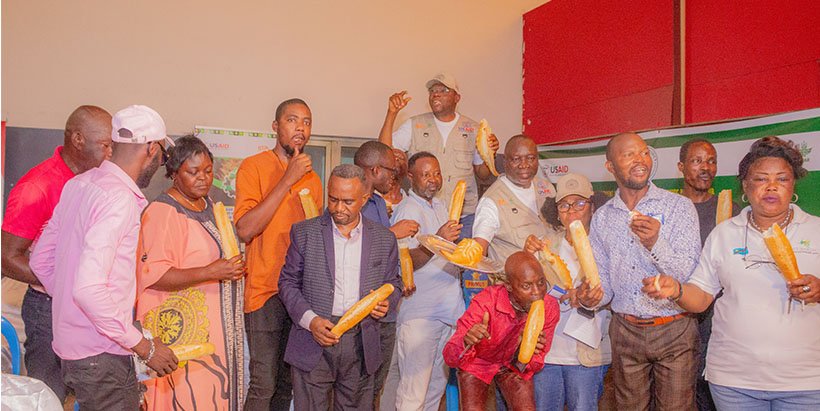Happy participants eating products from HQCF at the end of the training. Photo Credit: IITA
By Zablom Oyugi, January 23, 2025, The CGIAR’s International Institute of Tropical Agriculture (IITA) through its Food and Nutrition Science Laboratory (FNSL) unit is promoting high-quality flour derived from cassava and underutilized legumes such as African yam bean and Bambara nuts as viable local alternatives to wheat flour and other nutrient-dense products.
In this, IITA-FNSL commits to ensuring food and nutrition security on the continent by harnessing the potential of IITA mandate crops and underutilized legumes.
This comes at a time Africa’s wheat imports are reported to be on the rise at an annual rate of 9%, with East and West Africa being the highest importers. This has increased the cost of wheat and its derived products, intensifying economic challenges.
Through capacity-building initiatives, the unit is equipping youth, entrepreneurs, and communities in various countries with the knowledge and skills to develop products using these crops.
This approach reduces dependency on costly imports, bolsters food sovereignty and fosters resilient food and nutrition systems.
In 2024, IITA-FNSL employed participatory strategies to advance cassava product development. Data were collected from training sessions, capacity-building workshops, and product development exhibitions emphasizing gender inclusion.
The data analysis revealed over 300 local entrepreneurs and small-to-medium enterprises (SMEs) across Africa were trained in cassava processing.
Participants were trained in producing High-Quality Cassava Flour (HQCF), cassava-wheat composite bread, and other value-added products derived from cassava, maize, soybeans, and cowpea.
Additionally, IITA-FNSL collaborated with the Society for Underutilized Legumes (SUL) to train students and scientists on product development using African yam beans and Bambara nuts. This reinforced SUL’s commitment to enhancing food security through the use of local and underutilized crops.
IITA Nutrition Research Associate Gregory Nwaoliwe said, the FNSL unit is actively encouraging partnerships with other programs to further its mission of achieving a food-secure future. According to him, “These collaborations aim to maximize nutrient availability, improve dietary intake, and combat malnutrition in key communities across sub-Saharan Africa.”
Looking ahead, IITA-FNSL will focus on expanding the adoption of HQCF as a substitute for wheat flour. This strategy will help to improve the livelihood of millions and enhance foreign exchange earnings, contributing to a more sustainable and food-secure Africa.







